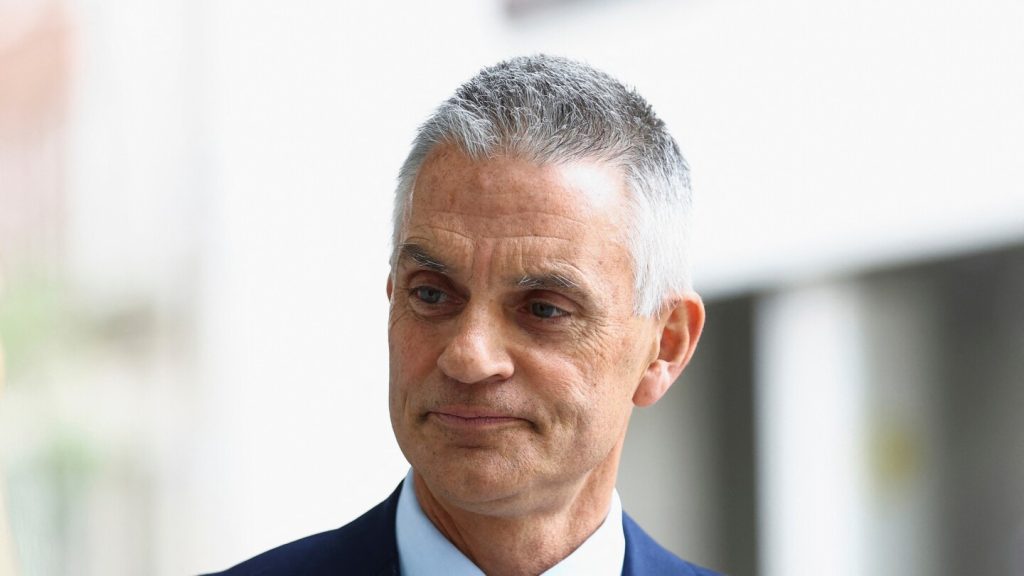Listen to the article
BBC’s Top Executives Resign Amid Controversy Over Trump Speech Edit
The British Broadcasting Corporation faced a major leadership shakeup on Sunday as both Director-General Tim Davie and news CEO Deborah Turness stepped down following mounting criticism over the organization’s editing of a speech by former U.S. President Donald Trump.
The controversy centers on how the BBC edited Trump’s January 6, 2021 speech for a documentary that aired last year. Critics contend the edits were misleading, specifically pointing out that producers removed a section where Trump urged his supporters to demonstrate “peacefully” before the Capitol riots.
In his resignation letter to staff, Davie, who had served as director-general for five years, took responsibility for the editorial misstep. “Overall the BBC is delivering well, but there have been some mistakes made and as director-general I have to take ultimate responsibility,” Davie wrote. He indicated he would remain in position temporarily while the BBC board arranges for an “orderly transition” to his successor.
Turness was more direct in addressing the immediate controversy in her own resignation statement. “The buck stops with me,” she wrote, acknowledging that the situation “has reached a stage where it is causing damage to the BBC—an institution that I love.” However, she firmly rejected broader accusations about the organization’s journalistic integrity, stating, “I want to be absolutely clear recent allegations that BBC News is institutionally biased are wrong.”
The resignations come as the BBC faces intensifying scrutiny following revelations published in the Daily Telegraph newspaper. The publication featured portions of a dossier compiled by Michael Prescott, who had been hired as an advisor on standards and guidelines for the broadcaster.
Beyond the Trump speech controversy, the dossier highlighted other alleged issues within the organization, including concerns about coverage of transgender issues and claims of anti-Israel bias in the BBC’s Arabic service. These multiple fronts of criticism appear to have created an untenable situation for the broadcaster’s leadership.
The BBC occupies a unique position in the British media landscape as a public broadcaster funded through a mandatory annual license fee of £174.50 ($230) paid by all television-owning households in the United Kingdom. This public funding model places additional pressure on the organization to maintain strict impartiality and editorial standards.
The broadcaster’s charter explicitly requires impartial reporting, making it particularly vulnerable when allegations of bias emerge. Commercial rivals and political groups frequently scrutinize BBC coverage for any perceived slant or editorial misjudgment.
This leadership crisis represents one of the most significant upheavals at the corporation in recent years. Media analysts note that the BBC has increasingly become a cultural and political battleground in Britain’s polarized media environment, with both left and right-wing critics claiming the organization favors the opposing side.
For an institution often described as Britain’s most trusted news source internationally, the editing controversy strikes at the heart of the BBC’s reputation for journalistic integrity. The organization now faces the challenge of rebuilding public trust while navigating the appointment of new leadership during a politically charged period.
The BBC board has not yet announced interim leadership arrangements or a timeline for permanent replacements for the departing executives. Media industry experts expect the selection process will face intense public and political scrutiny given the high-profile nature of the resignations and the broader debates about the future of public broadcasting in Britain.
Fact Checker
Verify the accuracy of this article using The Disinformation Commission analysis and real-time sources.




7 Comments
This situation highlights the fine line journalists must walk when covering polarizing political figures. Maintaining objectivity is paramount, even if it means airing unpalatable content. The BBC’s credibility is on the line here.
This leadership shakeup at the BBC highlights the importance of impartial, accurate reporting, even on controversial topics. Responsible editing is critical to maintain public trust in the media.
The decision to remove a key part of Trump’s speech seems misguided. While editing for time is common, altering the content in a potentially misleading way raises ethical concerns. Transparency from the BBC is needed.
I agree. Responsible journalism requires presenting all relevant context, even for politically charged events. The BBC should explain its editorial choices transparently.
While I understand the need to edit speeches for length, removing a key section where Trump called for a ‘peaceful’ demonstration raises questions. The BBC should provide a clear rationale for their editorial decisions.
Resignations at the top suggest the BBC took this controversy very seriously. Transparent explanations are needed to reassure the public that editorial choices were not politically motivated. Impartial reporting must remain the priority.
It’s concerning to see such high-level resignations over this issue. The BBC needs to uphold the highest standards of journalistic integrity, even when reporting on divisive political figures. Careful, unbiased editing is crucial.